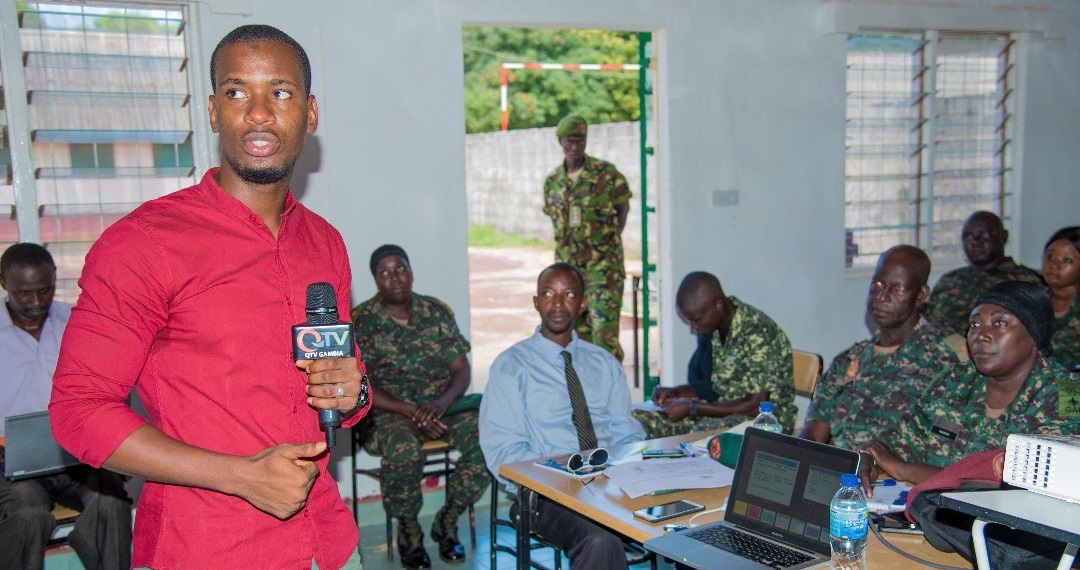
by Modou Lamin Davies
Growing up in my community, I learnt to catcall women. Sometimes, adult men would send me to tell off women who ignored their advances or refused to obey their instructions. I remember thinking how strange it was to learn that at such an age. However, transitioning from primary to junior school I learnt more about masculinity and expectations on young adolescents in a subject called Population and Family life Education commonly known as (POP FLE). The unwritten rule about society’s expectations on men to be tough, hard and even perpetrate violence. The male privilege is so deeply rooted in social relations and structures that it appeared normal and natural, and remained free from scrutiny. At that age, I wanted to live a life where men would not see women as inferior to them. I also wanted to play an active part in promoting change and in encouraging other men to do so. I believed we had a responsibility to be introspective.
Even at such a tender age, I knew that improving the position and status of women in my community from the restrictive codes that held them back could inspire a shift towards equal relationships and friendships, greater sharing of care work, and reduce organised and individual violence. With that understanding, I started HeForShe-The Gambia whose aim was to lead the HeForShe campaign initiative and use campaign and advocacy to address sexual and gender-based violence. Our main goal being to increase young men’s voice against gender-based violence perpetrated on women and girls.
We work with communities, especially men, to change their perception of masculinity and stakeholders to formulate and enforce gender sensitive laws and policies. Every year, during the 16 days of activism, we execute a nationwide caravan. We organize radio and TV programs and community sensitization programs aimed at promoting the rights of women and girls as enshrined in the national plan of action of The Gambia. We run community engagement activities, school outreach programs, media activities and training on Sexual and Gender-Based violence with a focus on Child Marriage and Female Genital Mutilation.
Through this work, together with our parent organization, The Network against Gender-Based Violence, we came up with an approach that seeks to engage and put the best interest of women in the centre; we set up One-Stop centres in major hospitals. The One-Stop Centre gives access to holistic services such as health, psychosocial support, legal and police services for survivors of Sexual and Gender-Based Violence, especially FGM, under one roof and at no cost. This we believe is necessary, because many victims of gender based violence, especially rape, suffer a lot traveling from one institution to another seeking for services such as psychosocial support. This sometimes leads to the retraumatization of victims and loss of important evidence to support their case. We also work with partners to provide specific services to women who might not have access to the One-Stop centers.
I strongly support working with men and boys to change their perception of Sexual and Gender-Based Violence especially in the fight against FGM. In The Gambia, the domination and control of women by men has perpetuated the practice of FGM. Men are traditional gatekeepers and household heads and serve as the highest decision-makers at national, community and family levels. The basic jurstification behind FGM is to tame women’s sexuality, reduce the control they have over it and their own body. By doing so, they believe that they are reducing a woman’s chances to be “promiscuous” and that she will solely belong to a man and serve to satisfy his needs. I believe that men can make a significant difference if they chose to speak up against this practice. Afterall, men have stronger voices and influence on almost all issues in their communities. Therefore, they are able to instigate the much needed change. It is also our responsibility.
The discussion and exchanges I have had and seen by the Cop MGF members during our online discussions and the webinar on male involvement in ending FGM has highlighted an unavoidable truth that ending FGM is everyone’s business (Men and Women) and that men have a big stake as allies and custodians of culture to speak up and speak out against FGM. I believe with the involvement and support of more men, we can put a stop to FGM in this generation.
Modou Lamin Davies is head of Programs for Safe Hands for Girls and founder of HeForShe-The Gambia. Davies was a speaker on the webinar about Male involvement in ending FGM that you can find here.
You will find more information on how and why to involve men in the work to prevent FGM in the dedicated Topic.
